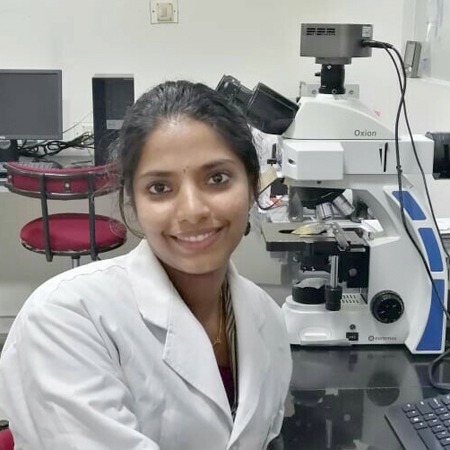

Dr. Renjith P. Johnson
Associate Professor
-
PhD, Pusan National University, Republic of Korea
-
MSc: Chemistry
-
renjithjohnson@yenepoya.edu.in
Dr. Renjith P. Johnson is an Associate Professor in the Smart Materials and Devices Division, Yenepoya Research Center (YRC), Yenepoya (Deemed to be University). In 2014, he earned his Ph. D (Polymer science and Engineering) in the laboratory of Prof. Il Kim at Pusan National University, Republic of Korea. Dr. Renjith completed the post-doctoral trainings at PNU, and at University of South Carolina, USA. Dr. Renjith joined in 2016, and heads the Polymer Nanobiomaterials Research Laboratory at YRC. Dr. Renjith’s research areas are focused in Synthetic Chemistry, Polymer Science, Biomaterials Science and Nanoscience.
PostDoc/Experience
- Associate Professor (Apr 2023-till date) – Yenepoya Research Centre, Yenepoya (Deemed to be University), Mangaluru, India
- Assistant Professor (Apr 2016-Mar 2023) – Yenepoya Research Centre, Yenepoya (Deemed to be University), Mangaluru, India
- Postdoctoral Fellow (Apr 2015 – Feb 2016) – University of South Carolina, USA
- Postdoctoral Fellow (Jan 2014 – Mar 2015) – Pusan National University, Republic of Korea
Research Interest
Organic Chemistry, Polymer Chemistry, Drug Delivery, Biomaterials Science, Nanoscience
Research
The Polymer Nanobiomaterial Research Laboratory focuses on the development of functional polymers for broad range of applications in material science and biomedicine. Specific interest focused in the design and synthesis of bioresponsive polymers, prodrugs, nanogel and hydrogels. Our effort includes the development of novel block copolymers through the modern CLRP techniques and click chemistry strategies, stimuli-responsive hydrogel and nanogels based on natural and biocompatible synthetic polymers for drug delivery, and wound healing applications. We also investigate to develop biocompatible and degradable polymer-based scaffold biomaterials for tissue engineering applications.
- Renjith P. Johnson, Young-Il Jeong, Eunji Choi, Chung-Wook Chung, Dae Hwan Kang, Sae-Ock Oh, Hongsuk Suh, Il Kim, “Biocompatible poly(2-hydroxyethyl methacrylate)-b-poly(L-histidine) Hybrid materials for pH-Sensitive intracellular anticancer drug delivery,” Advanced Functional Materials (2012), 22, 1058–1068.
- Renjith P. Johnson, Young-Il Jeong, Johnson V. John, Chung-Wook Chung, Dae Hwan Kang, Manickam Selvaraj, Hongsuk Suh, Il Kim, “Dual stimuli- responsive poly(N-isopropylacrylamide)-b-poly(L-histidine) chimeric materials for the controlled delivery of doxorubicin into liver carcinoma,” Biomacromolecules (2013), 14, 1434–1443.
- Renjith P Johnson, Saji Uthaman, Johnson V. John, Hye Ri Lee, Sang Joon Lee, Huiju Park, In-Kyu Park, Hongsuk Suh, Il Kim, “Poly(PEGA)-b-poly(L-Lysine)-b-poly(L-histidine) Hybrid Vesicles for Tumoral pH-triggered Intracellular Delivery of Doxorubicin Hydrochloride.” ACS Appl. Mater. Interfaces, (2015) 7, 21770−21779.
- Namitha K. Preman, Sindhu Priya E. S., Ashwini Prabhu, Sadiya Bi Shaikh, Vipin C., Rashmi R. Barki, Yashodhar P. Bhandary, P. D. Rekha, Renjith P. Johnson, “Bioresponsive supramolecular hydrogels for hemostasis, infection control and accelerated dermal wound healing” Journal of Materials Chemistry B, 2020, 8, 8585-8598.
- Renjith P. Johnson, Chandrahas Koumar Ratnacaram, Lalit Kumar, Jobin Jose, Combinatorial approaches of nanotherapeutics for inflammatory pathway targeted therapy of prostate cancer, Drug Resistance Updates, 2022, 100865.
| No | Title and Application Number | Country and Filing Date |
| 1 | Polypeptide based composite hydrogel scaffold for neural tissue engineering and process thereof (20224101365) | Indian Patent, 13.3.2022 |
| 2 | Sanitary devices with antimicrobial properties and disease indicators (202241010077) | Indian Patent, 24. 2. 2022 |
| 3 | Nanogel-based sustained drug delivery system (202041008226) | Indian Patent, 27.2.2020 |
| 4 | Anti-Dermatophytic hydrogel for topical applications (201941047486) | Indian Patent, 21.11.2019 |
| 5 | Wound healing hydrogel formulation and process for preparing the same, (201841037809) | Indian Patent, 05.10. 2018 (Granted) |
| No | Title of the project | Agency |
Amount
(Lakhs) |
Role | Period |
| 1 | Design and Fabrication of dual mode paper-analytical-device for point of care diagnostics | DBT-Bioengineering | 29.6 | Co-PI | 2017-2020 |
| 2 | Development of Thermoresponsive polymer nanogels for sustained release of Bevacizumab towards efficient treatment of diabetic macular edema | DST-SERB Core Research Grant (CRG/2018/000380-2019) |
38.78 |
PI |
2019-2022 |
| 3 |
Eco-friendly adult diapers with antimicrobial properties and disease indicators based on natural fibers and
hydrogels |
BIRAC (BIG Scheme) |
47.6 |
Co-PI |
2020-2022 |


